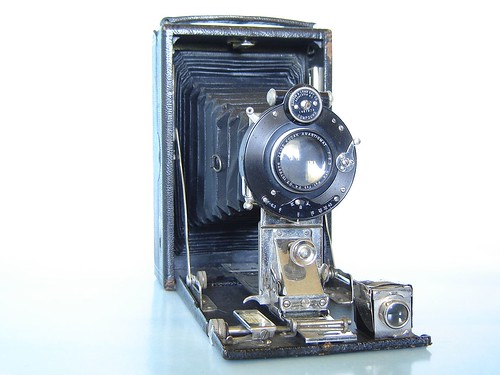Difference between revisions of "Filmplate Premo"
m (Took out size numbers I'm not certain of.) |
Hanskerensky (talk | contribs) (Added link to user manual page) |
||
| (5 intermediate revisions by 4 users not shown) | |||
| Line 7: | Line 7: | ||
|image_rights=nc | |image_rights=nc | ||
}} | }} | ||
| − | The '''Filmplate Premo''' is a folding bed camera for plates and film packs in several sizes, made by [[Kodak]] from 1906-16.<ref name=McK>{{McKeown12}}, p515.</ref> It is similar to the [[Film Premo]], which was intended only for film packs. The camera illustrated is the No. 3A size, for postcard format (3¼×5½ inch); the camera was also made in quarter plate (3¼x4¼ inch), 4x5 inch and 5x7 inch sizes. McKeown states that from 1912, the cameras equipped with the best lenses and shutters were sold as the '''Filmplate ''Special'' Premo'''; the camera illustrated is a 'Special', with a [[Zeiss]]-Kodak Anastigmat (i.e. a Zeiss lens design made by Kodak under licence), and a [[Bausch & Lomb]] Compound shutter (again, made by B&L under licence from [[Deckel]]) with speeds 1 - 1/200 second, plus 'B' and 'T'. It has a thumb screw below the lens to fix the lens standard vertical. This and the other metal parts are nickel-plated. There is a brilliant finder, which can be turned for use in horizontal or vertical orientation. | + | The '''Filmplate Premo''' is a folding bed camera for plates and [[Film Pack|film packs]] in several sizes, made by [[Kodak]] from 1906-16.<ref name=McK>{{McKeown12}}, p515.</ref> It is similar to the [[Film Premo]], which was intended only for film packs. The camera illustrated is the No. 3A size, for postcard format (3¼×5½ inch); the camera was also made in quarter plate (3¼x4¼ inch), 4x5 inch and 5x7 inch sizes. McKeown states that from 1912, the cameras equipped with the best lenses and shutters were sold as the '''Filmplate ''Special'' Premo'''; the camera illustrated is a 'Special', with a [[Zeiss]]-Kodak Anastigmat (i.e. a Zeiss lens design made by Kodak under licence), and a [[Bausch & Lomb]] Compound shutter (again, made by B&L under licence from [[Deckel]]) with speeds 1 - 1/200 second, plus 'B' and 'T'. It has a thumb screw below the lens to fix the lens standard vertical. This and the other metal parts are nickel-plated. There is a brilliant finder, which can be turned for use in horizontal or vertical orientation. |
| Line 15: | Line 15: | ||
==Links== | ==Links== | ||
| + | *[https://www.butkus.org/chinon/kodak/kodak_filmplate_premo/kodak_filmplate_premo.htm Filmplate Premo user manual] at [https://www.butkus.org/chinon/ Butkus.org] | ||
*[http://www.stronghorses.com/bstrong/cameras/cam_premo3AFP.htm 3A Filmplate Special Premo] on [http://www.stronghorses.com/ Bill Strong's site] | *[http://www.stronghorses.com/bstrong/cameras/cam_premo3AFP.htm 3A Filmplate Special Premo] on [http://www.stronghorses.com/ Bill Strong's site] | ||
| Line 21: | Line 22: | ||
[[Category:Postcard format]] | [[Category:Postcard format]] | ||
[[Category: Quarter plate]] | [[Category: Quarter plate]] | ||
| − | [[Category: | + | [[Category: US 4x5in folding]] |
[[Category: 5x7in]] | [[Category: 5x7in]] | ||
| + | [[Category:F]] | ||
Latest revision as of 06:59, 4 December 2022

|
| Filmplate Special Premo image by Bill Strong (Image rights) |
The Filmplate Premo is a folding bed camera for plates and film packs in several sizes, made by Kodak from 1906-16.[1] It is similar to the Film Premo, which was intended only for film packs. The camera illustrated is the No. 3A size, for postcard format (3¼×5½ inch); the camera was also made in quarter plate (3¼x4¼ inch), 4x5 inch and 5x7 inch sizes. McKeown states that from 1912, the cameras equipped with the best lenses and shutters were sold as the Filmplate Special Premo; the camera illustrated is a 'Special', with a Zeiss-Kodak Anastigmat (i.e. a Zeiss lens design made by Kodak under licence), and a Bausch & Lomb Compound shutter (again, made by B&L under licence from Deckel) with speeds 1 - 1/200 second, plus 'B' and 'T'. It has a thumb screw below the lens to fix the lens standard vertical. This and the other metal parts are nickel-plated. There is a brilliant finder, which can be turned for use in horizontal or vertical orientation.
Notes
- ↑ McKeown, James M. and Joan C. McKeown's Price Guide to Antique and Classic Cameras, 12th Edition, 2005-2006. USA, Centennial Photo Service, 2004. ISBN 0-931838-40-1 (hardcover). ISBN 0-931838-41-X (softcover)., p515.